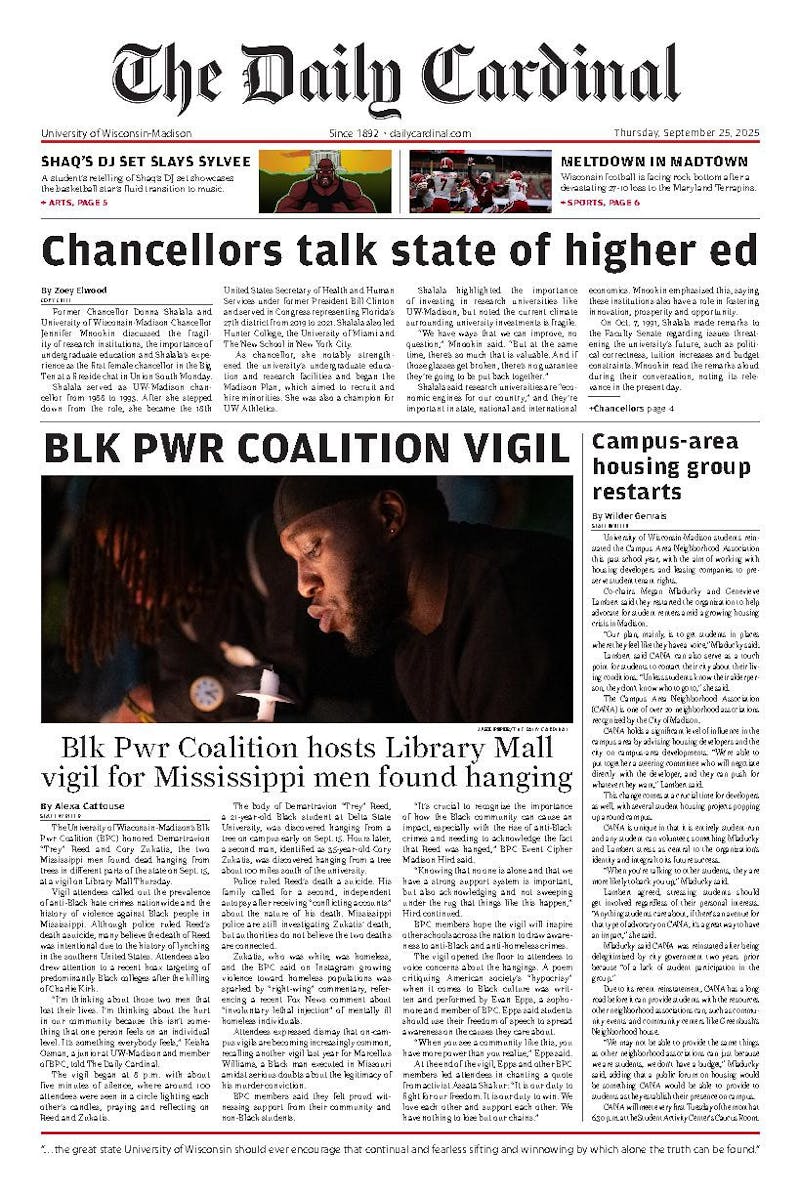Community members Megan Lowe and her daughter Nora said they live in fear as access to contraceptives in Wisconsin sits on the chopping block.
83% of disabled women will be sexually assaulted in their lifetimes.
“She is non verbal, she doesn't have use of her hands. This is extremely scary for me as her parent, and there are millions of women like her,” Lowe said. “They can't lose this access. If we lose this access I’m not sure what we would do…the questions just don't stop in my head.”
Lowe and her daughter shared concerns over access to contraceptives with Rep. Lisa Subeck, D-Madison, who led a roundtable event at Sequoya Madison Public Library on Sept. 26 — World Contraception Day. There, Subeck explained her reintroduction of The Right to Contraception Act, a bill she said will safeguard the right to contraception.
Subeck said they are “sounding the alarm” because the “Trump administration and Republicans have continued to mount attacks against healthcare and contraception.”
“It seems particularly pivotal given the attacks we have seen this week. We are announcing the reintroduction of the right to contraception act to safeguard every Wisconsinities access to the contraception that they need,” Subeck said.
The bill would codify Wisconsinities’ access to all contraceptives, including birth control pills, intrauterine devices and emergency contraception, into state law, as Supreme Court Justice Clarence Thomas previously proposed reconsidering the right to contraception.
Planned Parenthood of Wisconsin announced Sept. 25 they will pause abortion services beginning Oct. 1 due to Medicaid cuts under President Donald Trump’s Big Beautiful Bill. The decision leaves those seeking the procedure in Wisconsin with limited options.
A Navigator Research poll from 2024 showed that over 90% of Americans support the legal protection of contraceptives.
Subeck said it represents support across party lines. “You don't get 90% of Americans without it being bipartisan,” she said.
“Many people, namely Republicans, are still uncomfortable with the topic of abortion and have to get past that,” Subeck told The Daily Cardinal, adding Republicans have even argued against each other on that topic at past hearings.
Amid these debates, countless people are faced with making medical decisions they feel are necessary, even if the consequences are irreversible.
“I’m seeing more and more young people come to me feeling pressure to undergo sterilization because they feel like that’s a better alternative than nothing at all, even though they aren’t 100% certain about their desire to have a family in the future,” Dr. Laura Berghahn, an OB/GYN, said.
Berghahn said the effects extend past these patients. Medical professionals also have to consider the legal ramifications of performing abortion procedures.
“This isn’t just affecting planned parenthood… being on call and seeing a patient who needs a medically necessary abortion, I am stuck in a situation where I’m calling a hospital attorney to see if I can do this, rather than take care of the patient,” Berghahn said.
“Especially in college, when people are in their 20s, it’s a time of growth and learning and experiencing new things, and that does include sexual experiences,” Eliza Mednick, senior at the University of Wisconsin-Madison, said. “I think the research has shown time and time again, abstinence only is not something that is going to prevent unwanted pregnancies or dangerous pregnancies. Sexual assault on college campuses is very big problem, and not having birth control for these students is really really dangerous.”
Mednick interned with Planned Parenthood this past summer and saw first hand how people in these difficult situations can receive the help they need. She is now watching those rights be stripped away.
After several failed attempts, the Wisconsin Assembly passed a bill on Aug. 8 allowing pharmacists to prescribe certain contraceptives to their patients.
“By all accounts, a bipartisan bill,” Subeck said, adding with this bill in place, her only intention is moving forward with the community’s rights to birth control.
Subeck hopes to find an opportunity to shift the narrative around contraception, properly informing citizens on this form of healthcare as Planned Parenthood of Wisconsin is forced to pause their abortion services.
“I’m seeing now that I had more rights and opportunities than my daughter’s generation, and we can’t go back,” Berghahn said.






